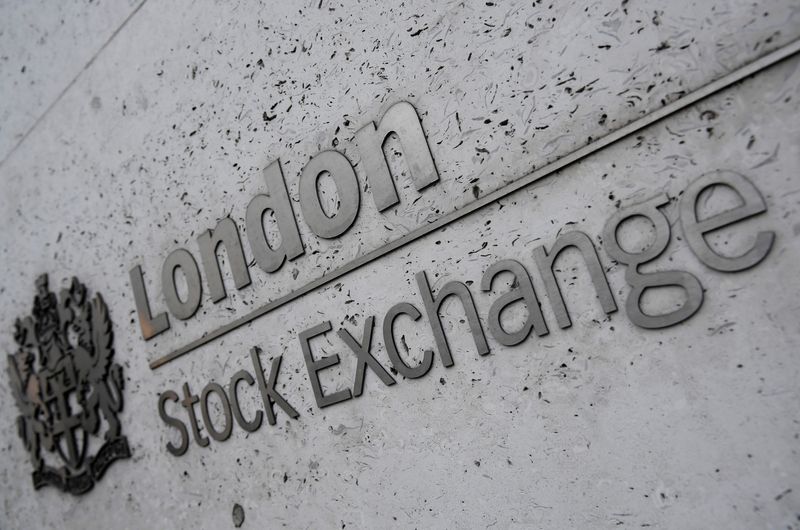By Ritvik Carvalho
LONDON (Reuters) - Global stock markets fell for a second day on Tuesday, as caution over a Dec. 15 deadline for the next round of U.S. tariffs on Chinese imports weakened risk appetite and limited outsized market moves.
Following their counterparts in Asia, European shares fell for again, with the pan-European STOXX 600 index down 0.4% at 0814 GMT. Germany's DAX fell 0.64% to its lowest in a week. (EU)
The MSCI All-Country World Index, which tracks shares across 47 countries, was down 0.1%.
Market uncertainty before the tariff deadline was reinforced by comments from U.S. Agriculture Secretary Sonny Perdue on Monday, who said President Donald Trump did not want to implement tariffs but did want to see "movement" from China.
The deadline looms over a series of events this week, with markets also awaiting the UK election on Thursday and U.S. and European Central Bank meetings.
Euro zone government bond yields were mostly steady, refusing to budge from recent ranges. Germany's benchmark Bund yield was steady at -0.30%, below a recent high of -0.26%. Italian 10-year bond yields, which fell on Monday, dipped 2.5 basis points to 1.36%. [GVD/EUR]
In the euro zone, Christine Lagarde holds her first meeting and news conference as ECB chief on Thursday.
"Expectations for policy action from the ECB and Fed are subdued," said Commerzbank (DE:CBKG) rates strategist Rainer Guntermann. "Lagarde's communication style will be watched closely, but that's unlikely to lead to any repricing in bond markets."
On Tuesday, the U.S. two-year yield, a sign of market expectations of Fed fund rates, was at 1.619%, down from its close of 1.627% on Monday. The 10-year Treasury yield was at 1.8138% from a U.S. close of 1.8225% on Monday.
A second reading of UK gross domestic product is due at 0930 GMT. The German ZEW economic sentiment index is due at 1000 GMT.
With investors reluctant to make big bets, MSCI's broadest index of Asia-Pacific shares outside Japan was 0.17% lower. China's benchmark Shanghai Composite index was off 0.08%.
New data in China showed producer prices fell in November while consumer prices spiked, complicating efforts to boost demand as economic growth slows.
Australian shares were down 0.34%. Japan's Nikkei fell 0.08%.
Tepid trade followed weakness on Wall Street overnight. The Dow Jones Industrial Average fell 0.38% to 27,909.6, the S&P 500 lost 0.32% to 3,135.96 and the Nasdaq Composite dropped 0.4% to 8,621.83.
Investors were also keeping an eye on the U.S. Federal Reserve. The Fed is expected to keep rates unchanged at its two-day policy meeting, which ends Wednesday. Analysts say investors will be watching policymakers' forecasts for future U.S. economic growth.
Investors have focused this year on the risks of the UK crashing out of the European Union without a deal and a sharp escalation in trade war tensions, said Frank Benzimra, head of equity strategy at Societe Generale (PA:SOGN).
"What you have seen since the end of the third quarter and the beginning of the fourth quarter was these two risks were receding ... And now this week you see those two concerns coming back on the market," he said, adding that he expected their effect would be short-term.
Sterling, which hit its highest against the dollar since April on Monday at $1.3180, added 0.1%, last changing hands at $1.3149.
Expectations of a Conservative Party victory in Thursday's UK election have powered a rally in the pound, but options markets indicate worries of a post-election retreat.
The dollar rose 0.06% against the yen to 108.62 and the euro was up 0.04% at $1.1069. [FRX/] The dollar index, which tracks the U.S. currency against a basket of six other major currencies, was down 0.04% at 97.609.
Worries over trade continued to push oil prices lower. Data released on Sunday showed that Chinese exports declined for a fourth straight month, underscoring the impact of the trade war between the U.S. and China, which is in its 17th month.
Global benchmark Brent crude fell 0.09% to $64.20 a barrel and U.S. West Texas Intermediate crude dipped 0.1% to $58.95 a barrel.

Gold rose, fetching $1,462.05 per ounce.